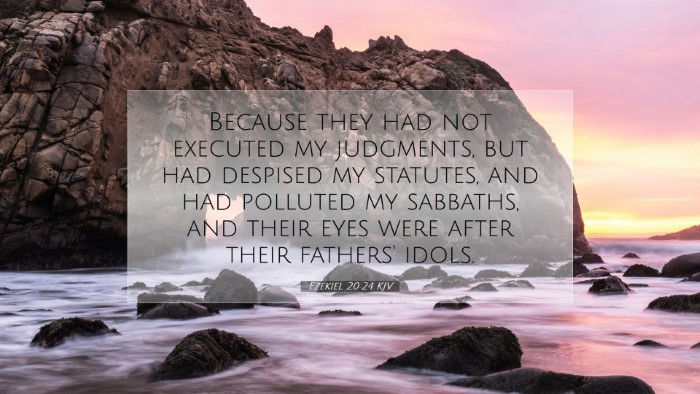Ezekiel 20:24 - Commentary
Verse: "Because they had not executed my judgments, but had despised my statutes, and had polluted my sabbaths, and their eyes were after their fathers' idols." (Ezekiel 20:24, KJV)
Introduction
The passage from Ezekiel 20:24 brings forth a weighty divine accusation aimed at the people of Israel. This verse is a part of a larger narrative in which God recounts the history of Israel's rebellion against His commandments. In reflecting on this verse, we will explore insights from various public domain commentaries to better understand its implications, theological significance, and lessons for contemporary faith communities.
Analysis of the Divine Accusation
In this verse, God articulates His displeasure over the Israelites’ failure to adhere to His judgments and statutes. The formulation of this accusation highlights the critical nature of divine law and the expected adherence from God's people.
1. Disregard for Judgments and Statutes
“...had not executed my judgments, but had despised my statutes...”
Matthew Henry points out that God’s judgments and statutes reflect His righteous governance over human conduct. The people of Israel were entrusted with His commandments, yet they failed to uphold them, demonstrating a profound disregard for His authority. This failure suggests a broader rebellion that not only involves overt disobedience but also a heart matter - an internal rejection of God’s guidance.
2. The Pollution of the Sabbaths
“...and had polluted my sabbaths...”
Albert Barnes emphasizes the significance of the Sabbath as a sacred institution meant for rest, worship, and renewing covenant relationship with God. In polluting the Sabbath, the Israelites demonstrated a grave disregard for this special time set apart for holiness. This act symbolizes a deeper allegiance to worldly pursuits and idolatries over divine rest and worship, revealing a systemic neglect of sanctification.
3. The Influence of Idolatry
“...and their eyes were after their fathers' idols.”
Adam Clarke notes that the acknowledgment of idolatry among the Israelites indicates their strong inclination toward inherited practices that were contrary to God’s laws. The phrase "their fathers' idols" suggests a generational transmission of apostasy, illustrating how familial ties can influence spiritual fidelity. The Israelites’ fixation on idols underscores the destructive power of cultural and familial influences that lead one away from worshiping the true God.
The Theological Significance
This passage serves as a sober reminder of the consequences of disobedience and neglect of divine mandates. It invites theological reflection on the nature of God’s justice, mercy, and the call to holiness. Here are some key theological implications drawn from this verse:
- The Sovereignty of God: God's judgments are not arbitrary; they reflect His sovereign will and divine order within creation.
- Human Accountability: The Israelites' failure signifies individual and communal responsibility in upholding God’s commandments. This principle stands true for contemporary believers, calling for a conscientious adherence to God’s Word.
- Idolatry's Consequences: The passage speaks to the dangers of idolatry and the necessity of vigilance against any entities or practices that could usurp God’s rightful place in believers' lives.
Lessons for Pastors and Theologians
As shepherds and students of the Word, there are profound lessons to glean from Ezekiel 20:24. Here are several applications for ministry and theological reflection:
- Teaching God’s Word: Pastors are reminded of the importance of teaching the whole counsel of God, including His statutes and judgments, to ensure that congregants understand their significance and the need for obedience.
- Encouraging Spiritual Vigilance: Leaders should encourage their congregations to be vigilant against modern idols, whether they be cultural norms, materialism, or personal ambitions that seek to draw attention away from God.
- Community Responsibility: The passage highlights the communal aspect of faith, urging congregations to hold one another accountable and to cultivate a shared commitment to honoring God's commands collectively.
Conclusion
Ezekiel 20:24 serves as a poignant reminder of the eternal relevance of God’s law and the importance of faithfulness. As congregations and individuals strive to honor God, it is imperative to recognize the areas of neglect in our own lives and communities, seeking restoration through repentance and a renewed commitment to God’s truth. Through faithful adherence to His Word, believers can honor the covenant relationship established through Christ, who fulfills the law and invites His followers into His rest.


